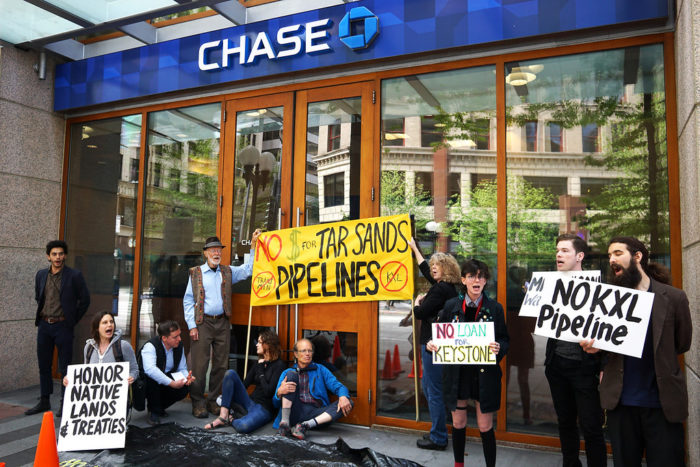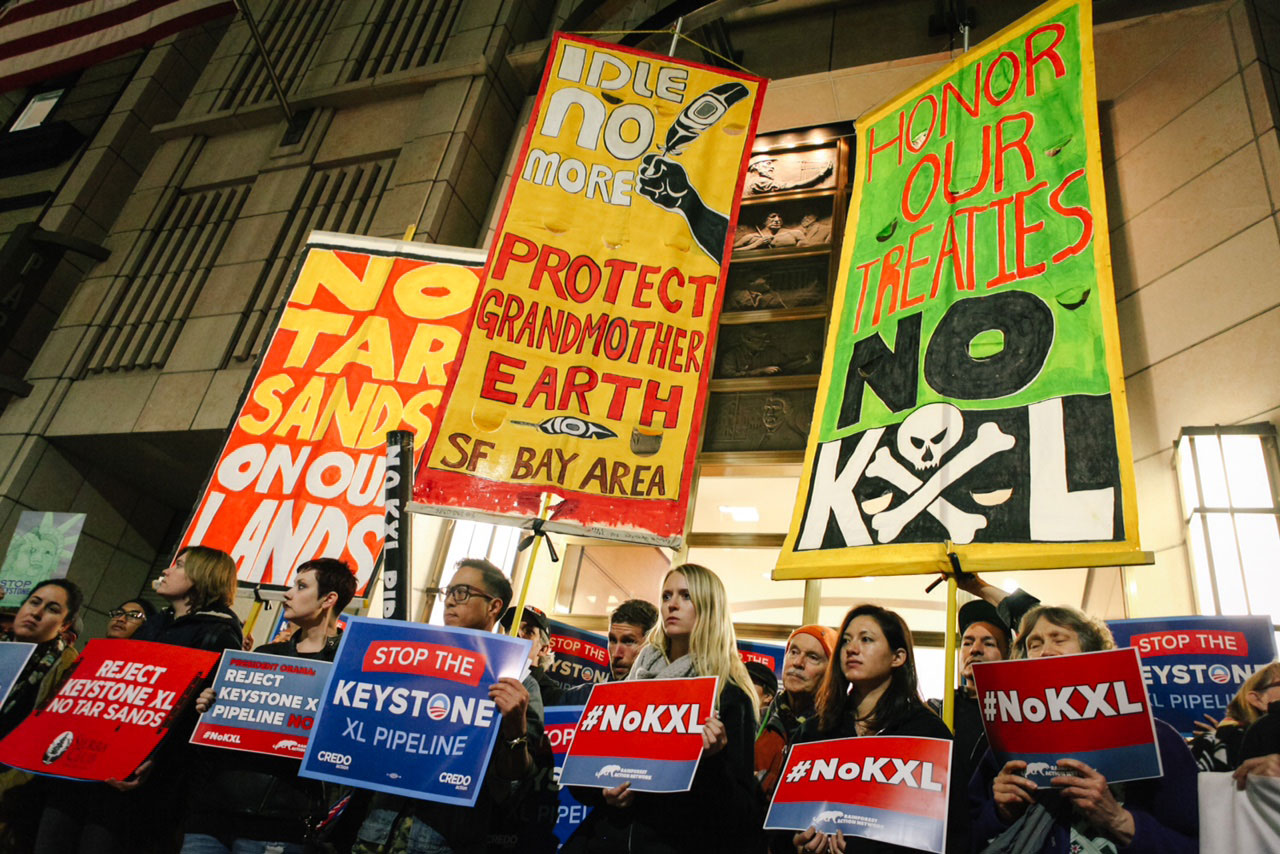May 2020 update

JPMorgan Chase remains the primary banker of the controversial Keystone XL tar sands pipeline through its support for TC Energy, the company behind the project. It’s followed by Bank of Montreal, and 18 other global banks, listed below.
But TC Energy also expects to get a $4.2 billion project finance loan to directly fund the upcoming costs of Keystone XL—despite active legal challenges, a lack of required permits, and without the free, prior, and informed consent of Indigenous communities along the proposed route. Banks must stay away from participating in the upcoming loan to this disastrous project.
What’s happening now
For over a decade, a powerful coalition of First Nations, ranchers and farmers, environmentalists, youth fighting for their future and people from all walks of life have resisted the construction of the 1,179-mile pipeline that would flow 830,000 barrels of oil a day from the Alberta tar sands to Nebraska, eventually heading to refineries on the Gulf Coast. Engaging in everything from lobbying to non-violent civil disobedience, they ultimately swayed Barack Obama to reject the pipeline.
However, Donald Trump attempted to revive the once dead pipeline with an executive order. Even so, the pipeline has faced massive hurdles, from lawsuits to major questions about its economic viability.
And indeed, the pipeline is only starting to move forward after massive subsidies from the Government of Alberta, showing how financially questionable the project is on its own. On March 31, 2020, TC Energy made a Final Investment Decision to move forward with the Keystone XL pipeline project, but only after getting subsidy commitments from Alberta to: (1) directly invest in the project, and (2) provide a guarantee for a multi-billion dollar loan.
First, the Government of Alberta will directly invest USD $1.1 billion as equity in the project. This $1.1 billion is to finance construction through 2020.
Then, Alberta is providing a USD $4.2 billion loan guarantee for the project’s 2021-22 costs. This enormous loan will likely be financed by private banks, and the Alberta government has made it enticing to banks by committing to pay back the loan if TC Energy is unable to.
In the days following this announcement, big banks like JPMorgan Chase, Citi, and RBC endorsed this decision by helping TransCanada Pipelines Ltd issue two new bonds.
TC Energy is starting preliminary construction on Keystone XL during a global pandemic, bringing in outside construction workers and endangering the health of rural communities along the pipeline’s route, and endangering the workers themselves. Across the globe, only essential work is being permitted, and there is nothing essential about this pipeline. In fact, the price of oil has fallen to its lowest level in nearly two decades.
Meanwhile, the Canadian government is also pushing forward another TC Energy pipeline called Coastal GasLink, despite massive Indigenous-led uprising. And some big banks are still supporting that disaster as well.
However, the future of both pipelines remains uncertain. For Keystone XL, key legal questions remain. In April 2020, the pipeline’s water crossing-permits were thrown into question with a ruling against the U.S. Army Corps of Engineers. This is only the latest challenge to the highly contested project and could result in a major delay or even an end to construction.
Who’s banking the pipeline? May 2020 update
Banks:
There’s currently no project finance package for the pipeline, so bank support for Keystone XL is coming from the banks that have made general corporate loans to TransCanada Pipelines Ltd., underwritten bonds issued by TransCanada Pipelines Ltd., and facilitated the sale of company assets. Those banks are as follows, in order of support:
1) JPMorgan Chase
JPMorgan Chase remains the primary banker of Keystone XL. JPMorgan Chase is the lead agent on the majority of TransCanada Pipelines Ltd.’s loans. The company currently has three loans worth a total of about USD$7.8 billion. Two of those, totaling USD$5.5 billion, were signed in December 2018 and extended by JPMorgan Chase and other banks just this past December 2019. JPMorgan Chase was the lead agent — the bank responsible for arranging the deal and coordinating between TC Energy and its lenders — on both of those new loans. That makes it the lead agent on more than half of TransCanada Pipeline Ltd.’s current credit. JPMorgan Chase also served as a lead manager of the most recent bond issued by TransCanada Pipelines Ltd. in April 2020.
In fact, JPMorgan Chase’s infamous position as the world’s biggest banker of fossil fuels is in part due to its close relationship with TC Energy: Chase’s biggest fossil fuel client from 2016-2018 was TC Energy.
JPMorgan Chase is the #1 banker of TransCanada Pipelines Ltd., and therefore of the Keystone XL pipeline, despite an Environmental and Social Policy (see p. 17) that expects clients to obtain free, prior and informed consent of Indigenous Peoples.
2) Bank of Montreal
Bank of Montreal is the lead agent on a CAD$3 billion loan to TransCanada Pipelines Ltd. It’s also a lender on the two more recent loans and was a co-manager of two recent bonds issued by TransCanada Pipelines Ltd. in September 2019 and April 2020.
3) 18 other banks
At least 18 other global banks are also supporting TransCanada Pipelines Ltd. in a range of roles on its current lines of credit and recent bond sales. These include:
-
- Canada: Alberta Treasury Branches, Canadian Imperial Bank of Commerce, Desjardins, Export Development Canada, National Bank of Canada, Royal Bank of Canada, Scotiabank, TD
- U.S.: Bank of America, Citi, Wells Fargo
- Europe: Barclays, Credit Suisse, Deutsche Bank, HSBC
- Japan: Mizuho, MUFG, SMBC Group
Insurers:
In addition to financing from banks, dangerous projects like Keystone XL also need insurance coverage. Insurance giant Liberty Mutual has provided a $15.6 million bond to cover risks related to the construction of the portion through South Dakota. In fact, although Liberty Mutual has restricted some support for coal companies, the company is a key backer of tar sands oil.
TC Energy is potentially arranging additional insurance to cover the construction of Keystone XL. Insurance companies must not support the project or any projects that so greatly threaten Indigenous rights, waterways, or the climate.
What’s next
At the time of writing (May 2020), Keystone XL has still not received final project financing from banks and likely has not secured its final insurance coverage. This means banks and insurers still have time to step away from TC Energy before they are forever tied to the shameful pipeline.
It shouldn’t have taken a decade for banks and governments to acknowledge that this infamous “carbon bomb” would trample Indigenous land rights and is incompatible with a stable future. We demand that banks and insurance companies cut ties with TC Energy and refuse to finance or insure the Keystone XL pipeline.
